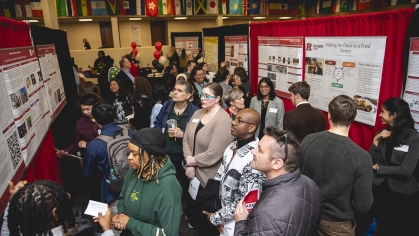Rutgers–Camden Professor Earns Prestigious 2021 Letitia Woods Brown Memorial Article Prize from Association of Black Women Historians

Boyd notes that her article will be a chapter in a book she is writing on Black entrepreneurship and racial capitalism in Great Migration-era Detroit.
Contrary to what the name suggests, says Kendra Boyd, the Detroit Housewives League was much more than a group of home-based consumers. However, it would take some digging to find the truth.
“As I delved deeper into my research, it became clearer to me that this organization was actually comprised of many Black businesswomen,” says the assistant professor of history at Rutgers University–Camden. “Just as importantly, these women would make integral contributions to business in Detroit in the early 20th century.”
Boyd uncovers the hidden entrepreneurship of the pivotal Detroit Housewives League in her article, “A ‘Body of Business Makers’: The Detroit Housewives League, Black Women Entrepreneurs and the Rise of Detroit’s African American Business Community,” published in the journal “Enterprise & Society.”
For her years of research on the article, the Rutgers–Camden historian has been named the recipient of the 2021 Letitia Woods Brown Memorial Article Prize, given for the best article focusing on African American women’s history, from the Association of Black Women Historians.

A 1933 directory created by the Detroit Housewives League under the auspices of the Booker T. Washington Trade Association.
Boyd notes that the article has been her passion project dating back to her undergraduate days at Wayne State University. Initially a business administration major, she recalls, she was researching Black women entrepreneurs in the public library when one of the archivists told her about the Detroit Housewives League. She learned that the organization, established in 1930, was considered a women’s auxiliary of a Black men’s organization called the Booker T. Washington Trade Association.
“The women’s organization was framed as an organized group of Black women consumers who used their money to support Black-owned businesses, mostly those owned by Black men,” says Boyd, who earned a Ph.D. in history from Rutgers University–New Brunswick.
As she investigated further, however, she found that many documents produced under the auspices of the Booker T. Washington Trade Association were in fact produced by members of the Detroit Housewives League. These materials included surveys, business directories, research articles and recommendations for improving business in the community.
“There was always this cross-pollination between the two groups and members of the Detroit Housewives League actually served on the board of the men’s organization; they were a key part of the membership,” she says.
Boyd’s article shows how these significant documents were later disconnected from the history of the Detroit Housewives League when they were included in a separate archive for the Booker T. Washington Trade Association.

Inside cover of the 1933 directory that shows committee members responsible for creating the directory were Detroit Housewives League women.
“A primary reason why the Detroit Housewives League has been misinterpreted is because of how these materials are housed in two separate archives,” says Boyd, who is a member of the first cohort of Early Career Faculty Fellows at the Rutgers Institute for the Study of Global Racial Justice.
The Rutgers–Camden historian further posits that, although the Detroit Housewives League name was a misnomer, it was an intentional one on the part of its members to avoid unwanted attention. She explains that they chose this name to abide by “the politics of respectability.”
“As a key strategy, they would try to fit themselves into these respectable categories of what it meant to be ladies,” says Boyd. “Keep in mind that this was a different era, when there was a lot of sexism and racism. Black women in particular were under attack by a lot of stereotypes that could be damaging to them.”
Boyd notes that her article will be a chapter in a book she is writing on Black entrepreneurship and racial capitalism in Great Migration-era Detroit. She also hopes that her article will cause historians of Black women’s history to look for Black women’s leadership and entrepreneurship in other fields, such as politics.
“Or, in some cases,” says Boyd, “maybe we look further into the same places where we’ve always looked, but just haven’t seen them.”


